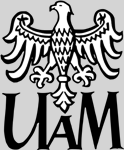Wladyslaw Zabrocki - Research
From Department of Applied Logic
(Difference between revisions)
| Revision as of 18:55, 29 June 2007 (edit) Zabrocki (Talk | contribs) ← Previous diff |
Current revision (13:41, 30 June 2007) (edit) (undo) Zabrocki (Talk | contribs) |
||
| Line 1: | Line 1: | ||
| - | In his writings, Dr. Zabrocki was primarily concerned with a methodological reconstruction | + | In his writings, Dr. Zabrocki was primarily concerned with a methodological reconstruction of |
| - | of the explanation procedure as conducted in the subsequent versions of the generativist paradigm. | + | the explanation procedure as conducted in the subsequent versions of the generativist paradigm. |
| He argued that in the newer versions of the generativist theory causal explanation has been | He argued that in the newer versions of the generativist theory causal explanation has been | ||
| replaced by a functional one. | replaced by a functional one. | ||
| - | The post doctoral dissertation that Dr. Zabrocki is preparing is concerned with a | + | Recent researches of Dr. Zabrocki is concerned with a reconstruction of the directives connected to psychological or sociological |
| - | reconstruction of the directives connected to psychological or sociological understanding | + | understanding of the subject of linguistic research. The author concentrates on three paradigms of linguistic |
| - | of the subject of linguistic research. The author concentrates on three paradigms of linguistic | + | |
| thought: historical-comparative, structuralist and generativist. | thought: historical-comparative, structuralist and generativist. | ||
Current revision
In his writings, Dr. Zabrocki was primarily concerned with a methodological reconstruction of the explanation procedure as conducted in the subsequent versions of the generativist paradigm. He argued that in the newer versions of the generativist theory causal explanation has been replaced by a functional one.
Recent researches of Dr. Zabrocki is concerned with a reconstruction of the directives connected to psychological or sociological understanding of the subject of linguistic research. The author concentrates on three paradigms of linguistic thought: historical-comparative, structuralist and generativist.



